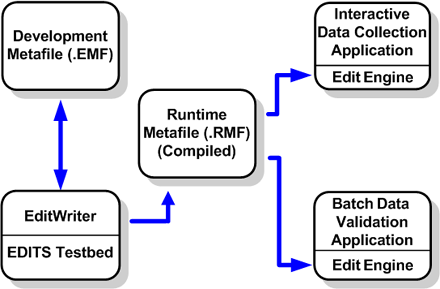NPCR–EDITS Tools for Writing Portable Edits
Parts of the NPCR–EDITS System
NPCR–EDITS (Exchangeable-edits, Data-dictionary, and Information Translation Standard) is a collection of tools that allows standard-setters to create rules for data quality. These rules are created in an executable form using the EditWriter program. The rules are expressed in the EDITS language and embedded in a binary file object known as an NPCR–EDITS metafile. The metafile contains all of the logic, tables, constants, and messages needed to test data items, one at a time or in groups, and report their compliance or non-compliance with the established standard.

Implementing a Standard
After a standard has been created, it is applied to data by driver programs that make use of the NPCR–EDITS application program interface (API). In this context, a driver program is any software program that makes calls to the functions of the Edit Engine to apply the data-checking logic of a metafile to data records. GenEDITS Plus is one such driver program distributed with NPCR–EDITS. Other drivers can be written for batch or interactive editing.
Many driver programs have been written to use standard rules for data checking stored in metafiles. Software developers include the capabilities of metafiles by linking their programs to the Edit Engine, a Microsoft® Windows® Dynamic Link Library (DLL) module of computer functions. The Edit Engine can apply a metafile's validity checks to data fields presented by the program calling the Edit Engine. The functions of the Edit Engine are made available to driver programs through the NPCR–EDITS API.
Several freely available Registry Plus programs are NPCR–EDITS driver programs. Some test data interactively under the control of an operator while performing other cancer registry functions. GenEDITS Plus is a program that reads a data file, checks all of the records in it according to rules in a metafile, and reports the results. Other driver programs, written by commercial and institutional developers, are used for batch or interactive editing.
Publishing a Standard
NPCR–EDITS is a unique means of publishing a standard. If you are setting quality standards for others to follow, you can distribute your metafile to all who must test their data against it. They can apply the logic of your standard just as you have written it. This is true even when your clients do not use the same driver programs.
NPCR–EDITS metafiles have been written for cancer registry data standards of the National Cancer Institute's Surveillance, Epidemiology and End Results (SEER) Program, the American College of Surgeons Commission on Cancer (CoC), and the North American Association of Central Cancer Registries (NAACCR). These standards are maintained actively by the respective organizations.
Logic Is Written in the NPCR–EDITS Language
The algorithms that check data are specified using the NPCR–EDITS language, a simplified programming language designed to validate data. The language includes a collection of powerful and specialized built-in functions that often reduce the complete data validation item to a single program statement. When complicated data relationships exist within a record, the NPCR–EDITS language can express a complex validation scheme, including multiple fields, multiple table lookups, nested control statements, local and global variables, and external functions.
- Page last reviewed: January 13, 2015
- Page last updated: January 13, 2015
- Content source:
- Maintained By:


 ShareCompartir
ShareCompartir